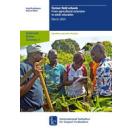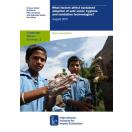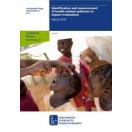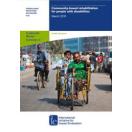
Farmer field schools: from agricultural extension to adult education
3ie Systematic Review Summary 1
Since the late 1980s, support to agriculture has moved from top-down agricultural extension towards more participatory approaches which better suit smallholder farmers. One such approach is the farmer field school (FFS), an adult education intervention which uses intensive discovery-based learning to promote skills. Although FFS has been used to train 12 million farmers in over 90 countries across Asia, Africa and Latin America, the effectiveness of this approach has long been a subject of debate.
Drawing on a systematic review of over 500 documents, this study finds that although FFSs have changed agricultural practices and raised yields in pilot projects, they have not been effective when taken to scale. The FFS approach requires a degree of facilitation and skilled trainers, which are difficult to sustain beyond the life of the pilot programmes. FFS typically promotes better use of pesticides, which requires hands-on experience to encourage adoption. As a result, diffusion is unlikely and has rarely occurred in practice.
This report by Hugh Waddington and Howard White is a summary of the following reviews :
- Why targeting matters: a systematic review of farmer field school targeting, by Daniel Phillips, Hugh Waddington and Howard White, 3ie Systematic Review 11
- Farmer field schools for improving farmer practices and farmer outcomes in low-and middle-income countries: A Systematic Review, by Hugh Waddington, Birte Snilstveit, Jorge Hombrados, Martina Vojtkova, Daniel Phillips, Philip Davies, Howard White, Campbell Systematic Reviews
Systematic Review findings
- The majority of FFS projects targeted better-off farmers, which appears to have been successful. Half of the projects used pro-poor targeting, which did not always succeed in reaching the target groups.
- Participating farmers typically benefit from FFSs based on integrated pest management (IPM) and other curricula. For scaled-up programmes implemented over longer periods there is no evidence of positive effects.
- Problems in recruiting and training appropriate FFS facilitators have impeded scaled-up programmes.
- Non-participating neighbouring farmers do not benefit from diffusion of knowledge about IPM from trained farmers. So even effective, small-scale FFS projects may not be cost-effective.
- The FFS approach will not solve problems encountered by large-scale agricultural extension programmes, and should be used selectively to solve particular problems in particular contexts.
- The rigorous evidence base is small. There are few rigorous impact evaluations, especially for programmes at scale, and there are none based on cluster-randomised assignment, a feasible approach for FFS.


